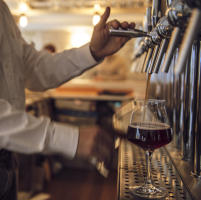
France’s once-vibrant beer brewing tradition lost its way in the 20th century. But now the beer drought is over. Thanks to a growing community of brewers, beer adepts and small businesses, the many shades of quality beer are expanding France’s drinking palette dominated until now by red, rosé and white. The craft of brewing fine beer is back and with it the art of enjoying it, as Kate Robinson reports from La Fine Mousse, the first bar in Paris to seriously specialize in craft beer.
By Kate Robinson
“I’m a fan of beers that are facile à boire, that you can drink the whole evening,” Daniel Thiriez said with a wry smile as he introduced the latest creation of his brewery Brasserie Thiriez. (Brasserie means brewery in French.) He’d been invited by the owners of Paris’s new craft beer bar La Fine Mousse to present his various brews, including his latest, La Petite Princesse, a pale gold, low-alcohol beer brewed in collaboration with the Austin-Texas-based Jester King brewery. The crowd at La Fine Mousse was in for a special treat that evening. “You’re probably the very first people in France to taste this on tap,” he said.
Until recently, opportunities like this to meet craft brewers or discover beers outside of the Heineken-AB-InBev-Kronenbourg industrial triumvirate on tap in Paris were few and far between. But the Great Beer Desert finally has an oasis: La Fine Mousse, the first bar in Paris to seriously specialize in craft beer. Located on a discreet corner of the 11th arrondissement one block from the heart of the lively Oberkampf neighborhood, La Fine Mousse, roughly translated as “The Delicate Head [of Beer],” offers a revolving selection of 20 craft beers on tap and nearly 150 bottled references, as well as a program of brewery nights, brewing classes, and tastings—all proof that good beer is making its comeback in Paris and in good company.
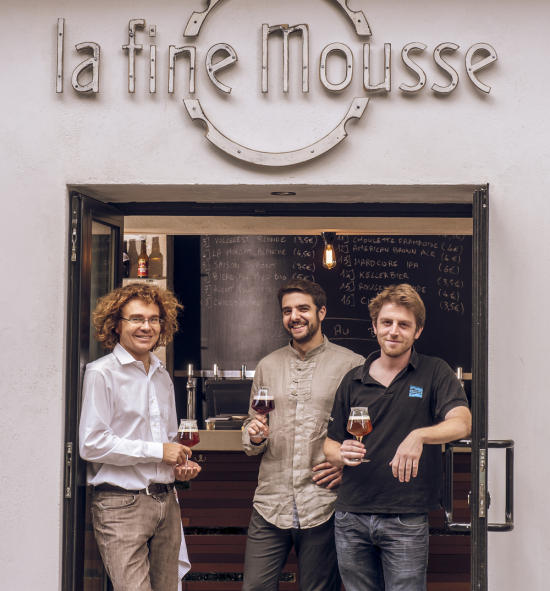
From couch to counter
Romain Thieffry, Cyril Lalloum and Laurent Cicurel, the trio behind the counter at La Fine Mousse, which opened in September 2012, are also behind Les Soirées Maltées, a Paris-based organization that has been bringing craft beer fans and brewers together since 2010. Their diverse backgrounds did not include experience in the bar or restaurant industry, but they shared a love of good beer and the frustration of not having a place to enjoy it.
“With Les Soirées Maltées, we discovered that there were many difficult-to-find craft beers in France and no bar, even in Paris, that represented the diversity and quality of French breweries,” says Romain. So the three beer-lovers, together with Simon Thillou, owner of the beer shop La Cave à Bulles near the Pompidou Center, decided to create a place dedicated to good beer.
The craft beer revival in France is recent, but the country’s dormant affinity for a good brew goes back a long way. At the end of the 19th century, soon after Pasteur demystified fermentation and long before Americans started putting their own spin on European brewing traditions, France was home to 2,827 large breweries, and thousands of small local operations peppered the country’s northern regions.
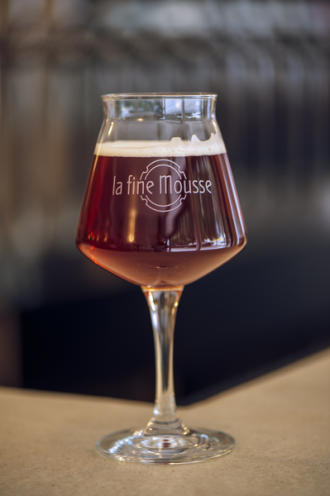
At the time, beer and wine were happy tablemates: both were products of strong local industries with deep connections to the land. But the early years of the 20th century were not kind to traditional beer-making. Many village breweries were run by men who ended up fighting and dying in the world wars, which left fewer people to carry on the tradition of craft beer. In the absence of strong local breweries, the industrial giants found an easy foothold. By the mid-1970s, only 23 breweries were operating in France.
It would be the mid-nineties before the first French craft breweries appeared and another decade or more before the public started taking notice. Today there are nearly 500 breweries in France—that’s more than there are in Belgium. While many limit themselves to a small locally-distributed production, altogether they reflect beer’s enormous diversity. Before the recent revival of craft beer, however, as wine continued to evolve in quality and diversity, beer in France followed an inverse curve of standardization and homogenization. From there, it was easy for wine sympathizers to cast beer as a second rate drink. In fact, much of the advertising for wine focused on reinforcing the wine-is-good-beer-is-bad dichotomy.
As a result, many French people were left with the impression that French beer was unfit for anything but guzzling on the couch while watching a football (soccer) match—and definitely not worthy of “tasting.” However, the brew-bashing may actually have supported beer’s transformation from maligned second-choice into a sought-after beverage in its own right that remains accessible even as it grows in prestige.
“People are afraid of making mistakes with wine and this has made it inaccessible and intimidating,” says Romain. Because beer lost the battle for preeminent national beverage, it still has a friendly, guy-next-door kind of approachability that makes it easy to get into. “People don’t have any complexes when it comes to beer.”
Raising the bar
La Fine Mousse is a friendly little bar where the uninitiated rub elbows with seasoned professionals. Having themselves evolved from beer enthusiasts to connoisseurs to mini beer geeks, as Romain puts it, the owners are as attentive to the novice as they are to the most accomplished brewer. “We tried to break the stereotypes with this bar,” explains Romain. La Fine Mousse has nothing in common with a typical zinc-inflected brasserie (in addition to meaning brewery, brasserie also means a large café-restaurant that naturally serves beer), nor is it a wood-paneled beer den. It’s a stone-textured place with subdued modernity that reflects both the terroir of craft beer and the demands of an urban clientele.
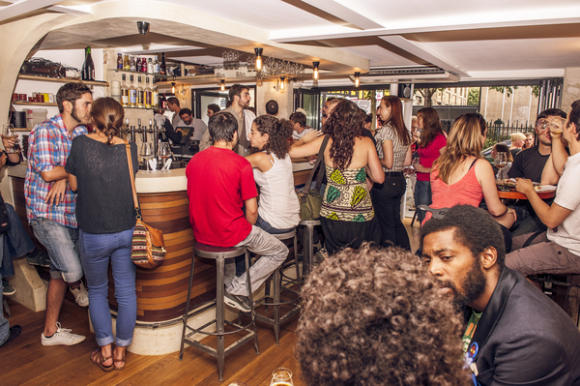
From the row of glistening taps to the rustically modern concrete bar to the custom-designed cold room and draft system, everything in La Fine Mousse has been thoughtfully chosen to create an environment conducive to discovery that reflects the exceptional beers available. “We want people to discover different styles and different breweries, to wake up their sense of taste and change their perception of beer. There’s real work and craftsmanship behind it and there are now excellent products out there,” Romain explains.
La Fine Mousse also wants to overturn the stereotype that a craft beer is an expensive beer. “We set out to prove to people that they can drink an excellent, high-quality product at the same price as an industrial beer,” says Romain. Most craft beers here cost 3.50€ to 7€ for un demi (a 25 cl glass of beer), about the same price as a Heineken at many bars and cafés in Paris. Bottles run 6-10€ plus some exceptional higher-priced beers from select brewers throughout Europe.
A chacun son goût – To each his own
The clientele at La Fine Mousse is as diverse as the beer on tap. From the elderly couple looking for a beer they tasted in Flanders to the group of women starting an evening out to the beer geek regulars who know every brew on the menu, La Fine Mousse has something for everyone. And half the fun of an evening at the bar is figuring out what exactly that something is.
The statement “I’d like a beer” triggers a series of questions to identify what you’d really like: Dark or light? Fruity or floral? A touch acidic? (In French or in English if you prefer.) “Some people find it a little disconcerting at the beginning because most of us aren’t used to making a choice about beer, like we would naturally with wine,” explains Romain.
Nevertheless, he says, most people get hooked once they begin to get a sense of the variety of tastes that beer can have. “They see very quickly that this beer is more flavorful than what’s usually available. Once they get into the game they’ll come in and say, ‘I want something that’s not too bitter, with a hint of fruit, a little bit of spice’—and when we find the beer that fits their taste and aromatic profile, they’re enchanted.”
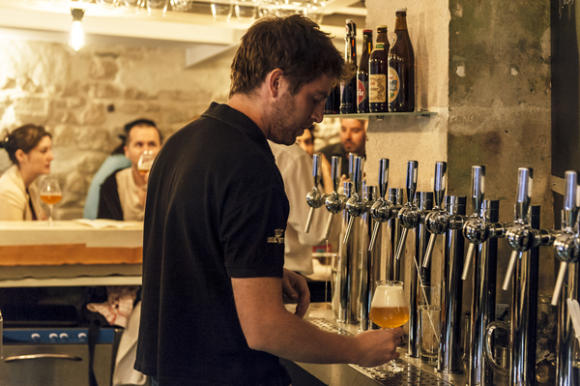
A beer near you
Romain sees the current interest in craft beer as part of a more general shift toward a “consume less, consume better” attitude, one that’s making people more receptive to a new way of thinking about beer. “We have so many good breweries [in France] that are making an incredible diversity of beer with a real savoir-faire,” says Romain. “Someone will try a beer and say, ‘Wow, this is excellent, where’s it from?’ When we tell them Paris or another region they know, the response is often ‘I had no idea.’”
That’s not too surprising considering that the craft beer revival in France is still quite young. “I was the only one in Esquelbecq when I started 16 years ago,” Daniel Thiriez explained to me during the evening dedicated to products of his brewery Brasserie Thiriez. Esquelbecq is less than 10 miles from the Belgian border in the Nord-Pas-de-Calais region. The village once had five breweries and more than 50 estaminets (the name for traditional northern pubs), but no beer had been produced in the village for 50 years by the time he moved into the former Brasserie Poitevin in 1996.
But Daniel Thiriez is no longer alone. While statistics show the decline of the French beer industry in general, the smallest breweries are maintaining double digit growth. In the last 15 years, the craft beer movement has produced some excellent breweries, including at least six in and around Paris.
Part of the charm of craft beer is that it starts out local somewhere. Rather than go through big distributors, the team at La Fine Mousse goes directly to most of the brewers. That might involve traveling a few hours from Paris to a beer fair or brewery or making a quick trip to Bagnolet, 15 minutes from the city center.
“There are talented brewers all around us,” says Romain. His advice to anyone interested is to go out and meet them. “Find the brewers in your area. They will be thrilled to show you what they’re doing. That’s what local is all about. You’ll see real craftsmanship at work, you’ll smell the grains that go into it, and you’ll drink a beer with the person who made it.”
The cream of the crop
Of France’s nearly 500 breweries a growing fraction are exceptional. Romain and his colleagues hunt down these liquid gems and offer them a wider audience. They decided from the beginning that French beers would represent half the menu at La Fine Mousse. Most of the other half are European brews though some come from overseas. “When we made our list of what we wanted to see on tap and in bottles, we realized that half were already French. We didn’t have to force to find them and that was a really nice surprise,” says Romain.
With so many good beers in France and elsewhere, choosing what to keep isn’t easy. Deciding on a selection of eclectic and refined flavor profiles accessible to both the inexperienced drinker and confirmed beer amateur means making some sacrifices. Stout, I.P.A., cervoise, barley wine and lambic are among the styles that circulate regularly through the 20 taps. “We made it a priority to have a truly diverse selection of breweries and styles,” explains Romain. “We might have 15 different styles of beer on tap so we rotate them frequently to feature different styles, but also different breweries and different styles within the same brewery.”
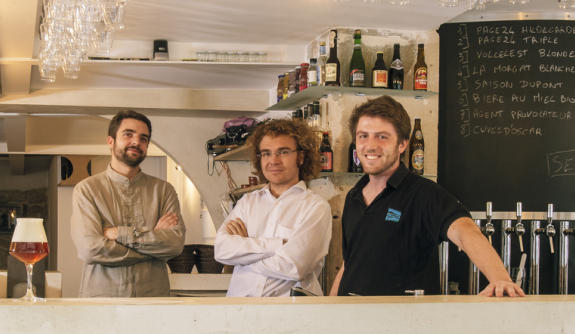
The beer that binds
There’s a strong spirit of exchange and innovation associated with craft beer and it’s one that La Fine Mousse actively supports. The bar already plays host to beer tastings, guest brewery nights and even beer-making classes with My Beer Company, a microbrewery just beyond the edge of Paris in Levallois. The bar and its owners are bubbling over with curiosity and passion which comes across in the attention they lavish on clients and the beers they serve. “There are still so many breweries that demand to be known,” says Romain.
The many small breweries appearing all over the country are redefining beer as a local product of quality. La Fine Mousse and a handful of other bars and beer shops are finally giving people a place to discover them, proof that wine isn’t the only drink worth ‘tasting’ anymore.
La Fine Mousse, 6 avenue Jean Aicard, 11th arr. Tel. 09 80 45 94 64. Metro Saint Maur or Ménilmontant. Open daily 5pm-2am. Cold cut and/or cheese plates can be ordered after 7pm. See the bar’s site for special events.
Other notable craft beer bars in Paris
Brewberry, 18 rue du Pot de Fer, 5th arr. Tel. 01 43 36 53 92. Metro Place Monge or Censier-Daubenton. Open Mon. and Tues. 3-9pm, Wed.-Sat. 12:30-11pm, Sun. noon-9pm.
Le Super Coin, 3 rue Baudelique, 18th arr. Metro Jules Joffrin or Simplon. Open Tues. and Wed. 11am-midnight, Thurs.-Sat. 11am-2am, Sunday 4pm-midnight.
Beer shops in Paris with a wide selection of craft beers
La Cave à Bulles, 45 rue Quincampoix, 4th arr. Tel. 01 40 29 03 69. Metro Les Halles, Rambuteau or Chatelet. Open Tues.-Sat. 10am-2pm and 4pm-8pm; closed Wed. Owned by Simon Thillou, co-owner of La Fine Mousse.
Bieres Cultes, 14 rue des Halles, 1st arr. Tel. 09 81 98 93 32. Metro Chatelet. Open Mon. 5-8pm, Tues.-Fri. 1-8pm, Sat. noon-8pm. Also stores in the 17th and 18th arrondissements.
Chop’In, 45 rue de Gergovie, 14th arr. Tel. 01 45 42 93 71. Metro Plaisance or Pernety. Open Tues.-Fri. noon-8pm, Sat. 10am-8pm.
La Moustache Blanche, 16 rue des Tournelles, 4th arr. Tel. 01 75 57 15 06. Metro Bastille. Open Tues.-Thurs. 11am-8:30pm, Fri. noon-9:30pm, Sun. 2-8pm.
People’s Drug Store, 78 rue des Martyrs, 18th arr. Metro Pigalle or Abbesses. Open daily noon-midnight, until 2am Fri. and Sat.
© 2013, Kate Robinson for publication in France Revisited
Kate Robinson is originally from the Pacific Northwest and has lived in Paris since 2004. A freelance writer and editor, she also organizes the reading series “Pause on the Landing” for the Paris literary journal Upstairs at Duroc.
Interested in organized beer and wine touring in the spirit of France Revisited? See here.


Oh I saw you visited some great places to drink craft beer in Paris.
When did you write this post ? There is some new awesome craft beer place now.
There are Supercoin, Les Trois 8 and many others.
Tom, Glad to hear that you like some of the places mentioned in this article. Thanks to Kate Robinson’s sense that a craft beer movement was underfoot, she proposed this article to France Revisited in the fall of 2012 and it was published in January 2013. Since then many new craft beer venues have indeed opened up and you’ll be reading more about them and the people behind craft beer in France before long. Stay tuned.
Gary
Gary Lee Kraut, editor